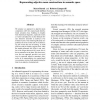Free Online Productivity Tools
i2Speak
i2Symbol
i2OCR
iTex2Img
iWeb2Print
iWeb2Shot
i2Type
iPdf2Split
iPdf2Merge
i2Bopomofo
i2Arabic
i2Style
i2Image
i2PDF
iLatex2Rtf
Sci2ools
EMNLP
2010
2010
Nouns are Vectors, Adjectives are Matrices: Representing Adjective-Noun Constructions in Semantic Space
We propose an approach to adjective-noun composition (AN) for corpus-based distributional semantics that, building on insights from theoretical linguistics, represents nouns as vectors and adjectives as data-induced (linear) functions (encoded as matrices) over nominal vectors. Our model significantly outperforms the rivals on the task of reconstructing AN vectors not seen in training. A small post-hoc analysis further suggests that, when the model-generated AN vector is not similar to the corpus-observed AN vector, this is due to anomalies in the latter. We show moreover that our approach provides two novel ways to represent adjective meanings, alternative to its representation via corpus-based co-occurrence vectors, both outperforming the latter in an adjective clustering task.
Corpus-based Co-occurrence Vectors | Corpus-based Distributional Semantics | Corpus-observed An Vector | EMNLP 2010 | Natural Language Processing |
| Added | 11 Feb 2011 |
| Updated | 11 Feb 2011 |
| Type | Journal |
| Year | 2010 |
| Where | EMNLP |
| Authors | Marco Baroni, Roberto Zamparelli |
Comments (0)

